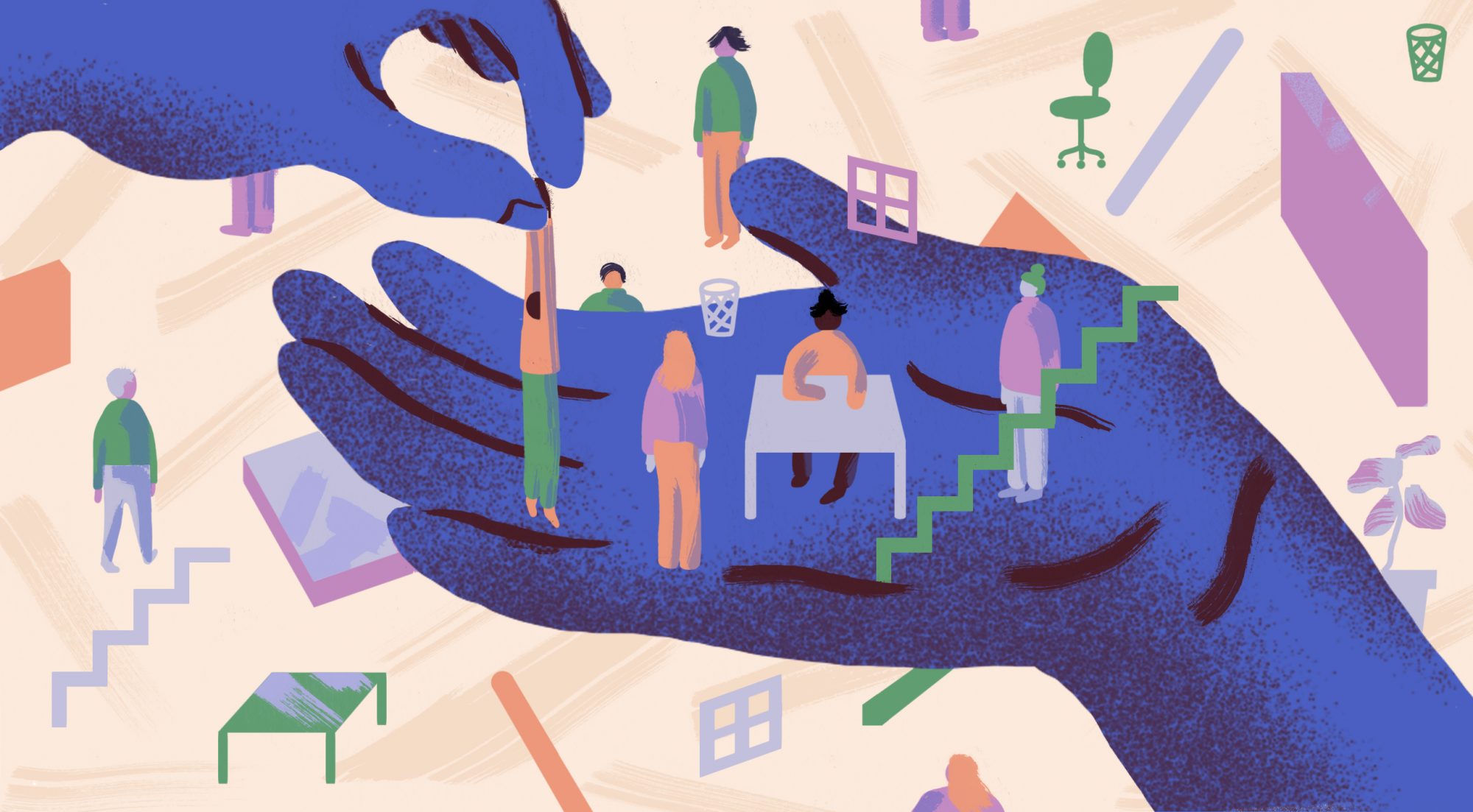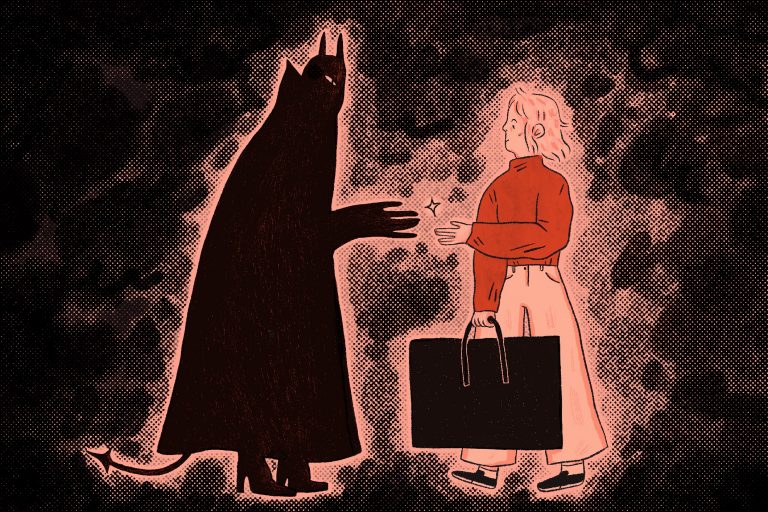
Room for Everyone
Niellah Arboine explains why workplace culture is so important and discovers that behind the flash office space, many creative companies still fall short
Words by Niellah Arboine
Illustration by Tsjisse Talsma
Office culture is the collective mindset of a business, it’s the personality and identity of a workplace and fundamentally encompasses how a business operates, how employees interact, the traditions, ethos and ethics of an organisation. It can be influenced by the physical space you work in but goes far deeper, a good office culture fosters happiness, wellbeing and through that, productivity. That said, many creative businesses seem determined to cut corners.
All workplaces should have well thought-out and cultivated processes for creating their culture, adeptly set by management, so that those values trickle down to the rest of the team. It’s not good enough for businesses to simply wing it and hope everyone gets along and works hard. Pressure is mounting on employers to take this seriously in more ways than one. Social media and the bravery of movements like #MeToo has empowered current and former employees alike to lift the lid on toxic workplaces, establishing another means for indiscretions to negatively impact profits.

From working as a theatre production assistant to being an editor of a magazine, workplace culture has affected my productivity and happiness in many ways on my career journey thus far. Office culture in creative industries can seem like an abstruse concept, and successful office culture isn’t solely working hard or playing hard. Office pooches, expensive desktops, lavish social trips and fancy open-plan offices might appear like an indicator of a swanky creative company, but all these aspects are just performative if fundamentally the employees aren’t happy. Simply throwing money at this does not work.
Having a workplace staffed by a diverse range of employees is crucially important, not just for the obvious moral implications, but also as diverse businesses perform better. Latest research from Mckinsey & Company concludes, “companies in the top quartile for gender or racial and ethnic diversity are more likely to have financial returns above their national industry medians.” Making steps to create a varied workforce is desperately needed especially in the creative sector. According to the Department of Culture, Media and Sport, “88.8 percent of jobs in DCMS sectors were done by people from a white ethnic group” and “in 2016, 63 percent of job roles were filled by men.” The statistics prove that the creative industry still has a long way to go. Without marginalised voices contributing to the discourse how are creative industries, especially media based industries meant show a valid portrayal of the world we live in?
Creating diversity just to fill quotas is tokenism and it’s a problem. There’s no point hiring just one black person, if, let’s say you’re going to blast Band Aid through the office every Christmas or pay closer attention to their new hairdo than to the work they’re producing. Constant, perhaps unconscious ‘othering’ of ethnic minorities through microaggressions is something I’ve experienced and believe me, it makes for an uncomfortable working environment. While fostering a group dynamic is important, it’s vital to be conscious of individual needs. Factors such as race, class, religion, disability and gender all play a massive role in how a team work collectively. As a black woman with dyslexia from a lower economic background, I’m usually the minority in these workplaces and as a new study in Harvard Business Review shows, that can also mean being overlooked when ‘glamour work’ is delegated, instead it’s ‘office housework’ that’s more likely to come my way.
Being the only minority in an office can feel isolating, whether you’re the only woman in a team, or the only person from a working class background. Whilst having “Friday beers” or pub outings is a nice gesture and a good way for the office to socialise, it can be quite isolating for some. What if you a practicing Muslim? Or if you can’t afford to buy rounds of craft beer at the local watering hole? I’ve had to awkwardly make excuses in the past for only getting a side and tap water at work lunches. For Paula Akpan who works in communications for a charity, the culture of drinking and socialising with colleagues is something she enjoys. “I love going out and drinking with my work friends” she says, “we’ve built a space where can talk through frustrations that we might not feel comfortable talking about in the office.” But Paula also understands that this isn’t for everybody. “I do think drinking can be ostracising, especially as we do it a lot at my workplace so we’re also trying to come up with more non-drinking socials so that we can involve more people in the office who are pregnant or might not drink.”

Another frustrating yet common consequence of not participating socially, is being labelled “miserable” or “unhappy” when you’re simply getting on and doing your work just like everyone else. It’s unfair to be penalised for not smiling enough or keeping to yourself especially when your work isn’t being assessed with the same scrutiny as your grinning abilities. This rhetoric is steeped in misogynoir. I have been pulled up for not smiling on at least two separate occasions, which is dispiriting when more favoured or established colleagues have awful attitudes. I’ve witnessed colleagues in higher positions abuse their power and come in late, be openly rude and angry yet nobody bats an eyelid. The truth is if you’re a runner or an intern or an assistant and find yourself as a minority in the workplace you’re unlikely to be treated with the same respect as your colleagues.
Liv Little, Editor-in-chief of gal-dem faced a range of challenges as a black woman starting out in the creative industry. “My first creative job was pretty toxic and really exploitative” she explains. It was a situation that resulted in her feeling like she had no option but to leave, convinced that “there were underlying tensions of racism and sexism threaded throughout the company.” It was a reality that came as something of surprise, as Liv had thought that her new career would represent a turning point. “I think I went into it with an idealistic perspective of what the creative industries would look like, but that job was like a reproduction of all of the negative experiences I had had whilst waitressing.” Indeed there’s an ever increasing body of evidence to suggest that below its liberal façade, there’s an ugly underbelly to large swathes of this sector.

There are a plethora of reasons why people feel uncomfortable or simply unable to socialise, especially outside of working hours. A good business will understand that. If you’re a single parent you might not be able to attend evening events, if you’re from lower economic background or earning less, bringing a packed lunch to work might be a necessity. If you simply just have other plans, let’s be honest, it’s your time and you are fully within your rights to choose how you spend it. Google, who may not always score great points ethically, actively seek to take the lead on some of these issues, providing child care centres and flexible paid parental leave.
Stress is one of the leading causes of underproductive companies. I’ve watched my managers burst into uncontrollable tears and colleagues wildly stabbing their keyboards in the office as late as 9pm. It’s not normal to cry in the toilet every week and working in an environment that’s negatively affecting your mental health isn’t a sign of a hard-working and successful business, it’s a sign that your office isn’t functioning effectively.
According to HSE, 12.5 million working days were lost due to stress, anxiety and depression in 2016/17 in the UK. It also accounted for 40% of all work-related ill health cases. Although demanding work does warrant engagement, it’s totally unrealistic and unreasonable to expect creativity to flourish if the workforce is miserable. In my previous theatre job, the company ran a wellbeing week. From puppy hugging workshops to counselling and therapeutic colouring in, they made a real effort to impress on us the importance of our own mental health. It may have only been for a week, but the positive impact of that slight attitude change continue to serve many of us very well.
For some, a nine-to-five culture simply doesn’t gel with an effective creative output. After quitting his last job, Will Furtado now works freelance in the publishing sector and is based in Berlin. The switch from a “feudal organisation with managers with no people skills” to working remotely has proven life-changing. “My current job involves lots of travelling, seeing the world and connecting with the diaspora” he beams. A non-traditional office structure is better for some and if the monotony of working set hours in the same space grinds you down, a change could benefit you too. For Will, “working with other people can be truly enriching and fun, but not with our current full-time culture of rigid structures and protocols.” Alternatively, occasional office check-ins and being granted the autonomy to “speak your mind, express yourself and be yourself without fear of being judged” can make for a healthy and productive set-up.
Clearly though, the creative industry isn’t all fixed-gear bikes, passive aggression and ‘random’ Friday beers. When honed correctly a viable business will also be one that people will be excited to work at. After starting out as an intern, Suyin Haynes is now full-time at TIME magazine in Hong Kong. “I was always encouraged to input my thoughts and ideas, no pitch was too silly, too small or too big” and for Suyin that’s a crucial aspect of a positive workplace culture, knowing that your employer is willing to cultivate your talents no matter how far up the ladder you are. Working for a business like TIME that spans across the globe, with offices in Hong Kong, New York and London allows Suyin and her colleagues near and far to “collaborate and bounce ideas off each other”. Building systems that encourage and allow employees to learn from one another and enrich each other’s experiences result in a win-win. In this digital age, a well established and diligently administered company culture can offer rich benefits for employer and employee, well beyond the four walls of a swanky office space.
Regardless of whether your business employs six people or six thousand, for a company to really flourish, a well-planned, fair and strongly implemented office culture can only improve a business. If you want great economic growth and retention rates while avoiding viral employee complaints and grotesque PR missteps doing irreparable damage, you need to build a strong and modern foundation, by ensuring that your workplace is open, accessible and attuned to the rich and diverse society that your staff and customers belong to.

This is the third piece in our four part series ‘Rigged System’, created in partnership with WeTransfer. It’s a project determined to start vital conversations about the current state of the creative industries. If we critique and challenge elements of the workplace, there’s a greater motivation for, and means of, positive change. We believe that inclusive, diverse workplaces are truly creative environments and are united in our mission to help people understand why. Room for Everyone is written by the brilliant Niellah Arboine who you can follow here. The feature has been brought to life exquisitely by Bologna-based illustrator extraordinaire Tsjisse Talsma, follow him on Insta, now. The final instalment of ‘Rigged System’ will be published in a fortnight.









